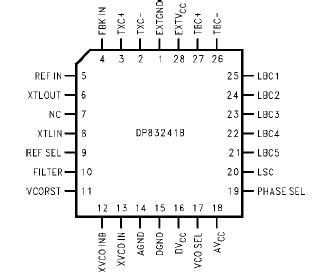DP83241: Features: · Provides 12.5 MHz and 25 MHz TTL clocks· 12.5 MHz and 125 MHz ECL clocks·5 phase TTL local byte clocks eliminate clock skew problems in concentrators· Internal VCO requires no varactors,...
floor Price/Ceiling Price
- Part Number:
- DP83241
- Supply Ability:
- 5000
Price Break
- Qty
- 1~5000
- Unit Price
- Negotiable
- Processing time
- 15 Days
SeekIC Buyer Protection PLUS - newly updated for 2013!
- Escrow Protection.
- Guaranteed refunds.
- Secure payments.
- Learn more >>
Month Sales
268 Transactions
Payment Methods
All payment methods are secure and covered by SeekIC Buyer Protection PLUS.

 DP83241 Data Sheet
DP83241 Data Sheet







